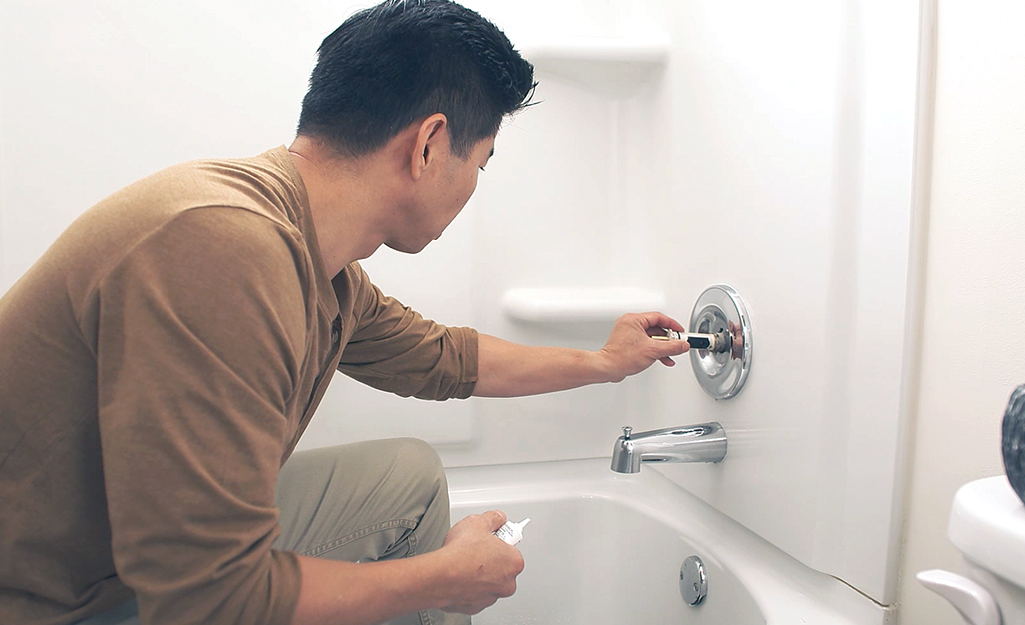Your Motives Behind Fixing a Faulty Faucet
Your Motives Behind Fixing a Faulty Faucet
Blog Article
On this page further down you can discover a bunch of decent additional info in relation to How to Fix a Dripping or Leaky Faucet .

Trickling faucets might seem like a minor hassle, however their impact surpasses simply the inconvenience of the sound. From drainage to sustaining unnecessary economic prices and health and wellness dangers, overlooking a trickling faucet can bring about numerous consequences. In this post, we'll delve into why it's critical to resolve this common family problem quickly and properly.
Wastage of Water
Ecological Effect
Dripping faucets contribute considerably to water wastage. According to the Epa (EPA), a single faucet trickling at one drip per second can squander greater than 3,000 gallons of water per year. This not only stress water sources but likewise affects ecological communities and wildlife dependent on them.
Step-by-Step Overview to Fixing a Dripping Faucet
Devices Required
Before trying to repair a leaking tap, collect the required devices, including an adjustable wrench, screwdrivers, replacement components (such as washers or cartridges), and plumber's tape.
Typical Tap Issues and Their Solutions
Determine the kind of faucet and the particular problem causing the drip. Common problems consist of worn-out washing machines, corroded valve seats, or malfunctioning O-rings. Describe maker guidelines or online tutorials for detailed assistance on repair services.
Financial Prices
Raised Water Costs
Beyond the environmental impact, trickling faucets can pump up water costs significantly. The accumulated wastefulness gradually equates into greater utility expenses, which can have been prevented with timely repair services.
Potential Residential Or Commercial Property Damage
In addition, extended dripping can bring about damage to components and surfaces surrounding the tap. Water accumulation can create staining, deterioration, and even architectural problems if left unattended, causing extra fixing costs.
Wellness Issues
Mold And Mildew and Mildew Development
The constant visibility of moisture from a leaking tap produces an ideal setting for mold and mildew development. These fungis not only endanger indoor air high quality yet also present health dangers, particularly for individuals with breathing problems or allergies.
Waterborne Diseases
Stationary water in trickling faucets can end up being a breeding ground for germs and various other virus, increasing the threat of waterborne illness. Pollutants such as Legionella microorganisms thrive in stagnant water, possibly leading to major ailments when consumed or breathed in.
DIY vs. Specialist Fixing
Benefits and drawbacks of DIY Repair
While some might attempt to repair a leaking faucet themselves, DIY repair work come with their own collection of difficulties. Without appropriate knowledge and devices, do it yourself attempts can aggravate the issue or cause insufficient repairs, lengthening the problem.
Benefits of Working With an Expert Plumber
Employing a specialist plumber ensures that the underlying root cause of the trickling tap is resolved properly. Plumbing technicians possess the expertise and devices to diagnose and fix faucet problems effectively, saving time and reducing the risk of more damages.
Ecological Obligation
Private Contribution to Preservation
Taking duty for taking care of trickling taps straightens with wider initiatives towards water conservation and ecological sustainability. Every individual's activities collectively make a considerable impact on preserving priceless resources.
Lasting Living Practices
By prioritizing punctual repair services and adopting water-saving practices, individuals add to sustainable living techniques that benefit both present and future generations.
Preventive Measures
Routine Maintenance Tips
To avoid trickling faucets, perform routine maintenance such as cleaning aerators, examining for leaks, and changing worn-out components quickly. Additionally, consider installing water-saving gadgets or updating to more reliable components.
Importance of Prompt Repairs
Resolving leaking faucets as quickly as they're noticed protects against more water wastage and prospective damage, ultimately saving both water and cash over time.
Impact on Property Worth
Perception of Well-Maintained Residential Property
Preserving a property in good condition, including attending to upkeep problems like trickling faucets, improves its viewed worth and desirability among possible customers or renters.
Influence on Resale Worth
Characteristics with well-kept plumbing components, consisting of faucets, command higher resale values in the realty market. Attending to dripping faucets can add to a positive impression during building inspections and negotiations.
Final thought
Attending to a trickling tap surpasses plain ease; it's a necessary action towards saving water, lowering economic prices, and safeguarding health and residential or commercial property. Whether with DIY repair work or expert support, acting to repair leaking taps is a little yet impactful method to promote responsible stewardship of resources and contribute to a much healthier, extra lasting future.
How to Fix a Leaky Faucet: Step-by-Step Repair Guide
A leaky faucet may seem like a simple annoyance, but if it's not fixed promptly, that leak could cost hundreds to potentially thousands. From water damage to mold, mildew, and high water bills, even a tiny leak can be catastrophic if left unattended. Damage like this can even affect the overall value of your home, so it's important to take the right approach for leaky faucet repair. You may need the help of a plumber in some cases, but we've got a few tips you can try on how to fix a leaky faucet before calling the pros.
Four Faucet Types
When you're learning how to fix a leaky faucet, the first step is knowing what kind of faucet you're working with! There are four common types.
Cartridge Faucets
Cartridge faucets come in one- or two-handled varieties. In one-handled cartridge faucets, hot and cold water combines in a single cartridge. In the two-handled versions, hot and cold water are controlled separately and mixed in the faucet.
Ball Faucets
Ball faucets have a single lever you push up and down to adjust the pressure and rotate to change the temperature. A slotted metal ball controls the amount of water allowed into the spout.
Compression Washer Faucets
They're the oldest type of faucet, but they're still used in many homes — especially older ones. Compression faucets have two separate handles that, when turned, raise or lower the washer that seals a water valve. This valve stops water from flowing through the faucet when it is turned off.
Disc Faucets
Disc faucets rarely need to be repaired due to their maintenance-free design. The water flow is controlled by two discs — the upper one raises and lowers against a fixed lower disc, creating a watertight seal. If your disc faucet starts leaking, you may need to replace the seals or clean residue buildup from the inlets.
Fixing a Leaky Faucet
Step 1: Turn Off the Water
Whether you're learning how to fix a leaky bathtub faucet or how to fix a leaky kitchen faucet, always turn off the water supply to your working area when you're fixing a leak. The last thing you want is a flood added to your list of things to fix.
Look for the shutoff valves below your sink or around the tub and turn them clockwise to stop the water flow. If your faucet doesn't have shutoff valves, you may need to turn off the water for the whole house. Check to make sure it's off by turning the faucet on. If nothing comes out, you're ready to start the repair.
Step 2: Take Apart the Faucet
How you disassemble your faucet depends on the type of fixture you have. You can use a flathead screwdriver to remove the caps on top of the handle or handles for cartridge and compression faucets. Inside, you should see handle screws. Unscrew these with a screwdriver to remove the handle.
Disc- and ball-style faucets will typically have an inlet screw near the handle, and removing that will reveal the interior of the faucet.
Detach the Valve Stem
For cartridge- and compression-style faucets, you'll see the inner valve stem or cartridge once you remove the faucet handles. If you have a compression faucet, unscrew the brass valve stem. If you have a cartridge faucet, pull out the cartridge. If your cartridge has been in place for a while, it may require some tools or extra force to remove it due to mineral deposits.
Examine and Replace Parts
Once you've removed the parts, check them out to confirm what needs to be replaced. You may see corroded rubber washers, O-rings, stems, or cartridges. On a ball-style faucet, check the seats and springs for damage.
If you need to repair a leaky disc faucet, check the inlet and seals on the lower disc.
Once you determine what parts must be replaced, visit your local hardware store. Bring the damaged parts with you to ensure you can purchase the correct components to replace them.
Clean Valves and Faucet Cavity
If you've removed a stem or cartridge, you may notice mineral buildup in the faucet's threads. Use white vinegar to clean the valve seat by soaking it for a few minutes, then scrub it away with a soft toothbrush and rinse with warm water. You can also clean the interior of the faucet in the same way.
Reassemble the Faucet
Once your faucet is cleaned and the required parts have been replaced, it's time to reassemble it. Put the pieces back together and slowly turn the water supply back on. Doing this slowly is crucial because too much initial water pressure can damage the new hardware you've just installed.
https://homewarranty.firstam.com/blog/how-to-fix-leaky-faucet

I ran across that content on 4 Common Reasons for a Leaky Faucet when looking around the internet. Liked our article? Please quickly share it. Let another person discover it. I enjoy your readership.
Report this page